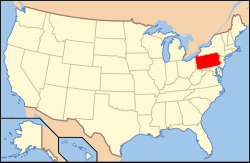Pennsylvania wine
Pennsylvania wine refers to wine made from grapes grown in the Pennsylvania.
History and notable features
[edit]Pennsylvania is the eighth-largest wine producing state in the country. The climate is mild compared to surrounding states, with the moderating effects of Lake Erie to the north and the Atlantic Ocean to the east. One hundred and nineteen wineries[2] are located in all parts of the state, including five designated American Viticultural Areas.[1]
The commercial wine industry had important roots in Pennsylvania. Around 1740, the first hybrid of vitis vinifera European grapes and vitis labrusca North American grapes was discovered near Philadelphia. It was initially named Alexander, after the gardener who discovered it.[3] In 1786, Frenchman Pierre 'Peter' Legaux founded the Pennsylvania Vine Company, also just outside of Philadelphia, which would become the nation's first commercial vineyard.[3]
References
[edit]- ^ a b "Pennsylvania: Appellation Profile". Appellation America. 2007. Archived from the original on December 16, 2014.
- ^ a b "Pennsylvania Wineries". Appellation America. 2007. Archived from the original on March 4, 2016. Retrieved January 30, 2015.
- ^ a b Madaio, Mike (2019). Lost Mount Penn: Wineries, Railroads and Resorts of Reading. Charleston, SC: The History Press. ISBN 978-1467141147.
External links
[edit]- Pennsylvania Wines at Pennsylvania Winery Association
- PA Vine Co. at Pennsylvania Winery Guide focused on dry wines


